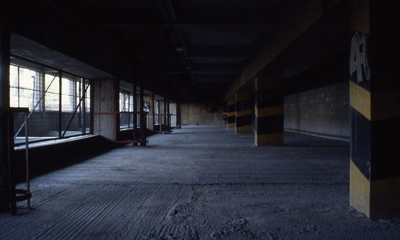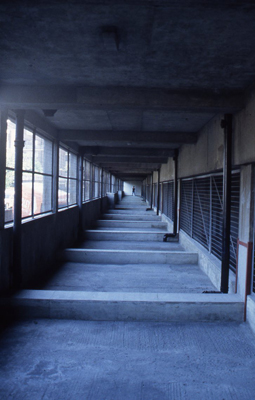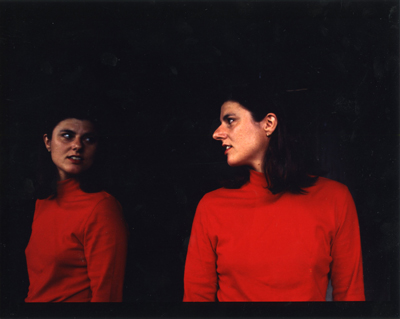Jacqueline Pennell
- Jacqueline Pennell – Press release
- Foreword, Mirror Mirror: Jacqueline Pennell – Rear Window
- The Other Site, Towards a Definition of Site-specificity – Jean-Paul Martinon
- From a Rear Window — Extract from a Journal – Peter Cross
- Mirror Mirror: Jacqueline Pennell – Rear Window
From a Rear Window — Extract from a Journal – Peter Cross
Rear Window Publications
1996 ISBN 0 9521040 6 7
© Peter Cross
January 15, 1993, 8pm.
My landscape is spread out in front of me at least to my side, outside a window which reflects me back to myself.
Yesterday, I was too tired at this time to register anything. But I was left with an expectation or a hope of seeing the same thing tonight, of being able to live around a routine, a sense of order, security. Instead, this expectation juggles in my mind with the (relatively) disappointing emptiness and sporadic bursts of activity that are really happening out there. Have already happened.
Last night at this time, in both the kitchens across the courtyards, teams of people seemed to be preparing meals. In one, two people were wearing tops of the same red-bright uncomplicated red. In the other, three or group people in t-shits busily working, moving form cupboard to sink to cooker, to an invisible fridge. They seemed to have a sort of spontaneous purpose, their ballet was sustained, complicated, and then was over—likewise on the floor below, at roughly the same time, both groups left their kitchens dark presumably to eat in another part of the house.
Tonight everything is different. Above, a woman stands briefly at the sink washing something, and then she is gone. Below, a man in white comes to the sink, looking irresolute, preoccupied. He is dimly lit in the pale white glow from the illuminated square niche lighting the room with a dim glow, as if he were a ghost.
Now a few minutes later the main light has been switched on, high in the ceiling and he has come back to work again at the sink, while another woman, still in the same red top as last night, comes and goes without stopping, without changing her movements to become involved in what’s happening in the room.
Writing about these people, this relationship that I was conscious of setting up not with them, but their domestic life, throws me back to myself. I become very aware of myself sitting at this desk writing, the constant hiss of my own gas fire in my own room. The reason is simple. I’ve taken a step in a certain direction and now, I am aware that those people may also be able to see me as I can see them.
Where before my work was abstract, recording light, anonymous windows with no human presence, that were simply lit up or were dark, recording animals, birds, wind, dawn, dusk, now I have the choice to go further, become personal, human, set up a connection that in my mind inevitably ends up with a real social interaction.
I remember with nostalgia when the house straight in front of me was empty, derelict. How, for months on end, years, that window was dead and blank, always half open, totally unused. In a short time, the house was renovated, then people moved in, started to live there. My solitary rule over the space our of my rear window was over. The houses in Dombey Street are, too far away; the houses in the other two streets that form the rectangle of space in front of my window are close enough so that the gaze from those windows crossover with mine at acute angle. But these windows are close enough to almost invite examination, while there is so much else to see that my eyes go to those windows for a moment out of a reflect—“Let’s see what they are up to.”
And my detachment has been threatened. My decision to be impersonal, looking only, has been subverted, and I am involved in a human situation, looking straight into the domestic lives of specific people.
I have to ask myself maybe properly for the first time, why and for whom am I writing this? Perhaps I’ve thought before: “I am writing it for them, as a way of making a bridge somehow to them.”
9.30pm
But there is no bridge, because I am not interested in the idea of an exchange with them. Their gaze, cutting across or noticing or reflecting back mine, undermines my project. But latently, critically, it also asks “what is you project?” Self-consciousness is forced on me, but my interest in others, however, elaborately disguised as objectivity, has created it in the first place.
So, again, what is the project? And where do I have to abandon it to ask myself what it is? When my project is more than the content of two of the windows that are part of a bigger constellation of windows—I could set about counting them, just as I could record the temperature, humidity, etc.—fifty, a hundred windows, all potentially as full of information, or as empty, as these two, which have cause me to halt in my tracks and which seem to be trapping—for that is the word tied up in track, tap—and as myself why, what, how, and for whom. To turn my attention to that other side of the work of making—analysing, placing, giving real or symbolic value.
The reason for that is precisely because these windows give me more accessible information—a more direct confrontation—than any other in my cityscape. They won’t allow me simply to “see” in a heroic, disinterested way, they won’t let my sensibility (another word, chosen from a vocabulary loaded with history) range over the whole field in a random “natural” way, to look for and to find abstract knowledge, as detached as possible from specifics.
I can’t talk, in relation to these windows about a “sense of place,” for example. I can’t muse about alienation, the disinherited, the misplaced, the nomadic quality of modern city life in a general way to produce an emotion as hard to pin down as whatever is beautiful about a bird in flight. These windows won’t let me play that game.
Now, those windows are blank, but the glass that separates my room from the outside becomes a mirror itself and the rectangle of light that once vividly held my interest now clearly reflects back the pool of light created by my lamp and everything that it lights up—a plant, a watch, a pen, somebody writing.
Looking at this reflection, I want to go back to the past. I want to go sideways, to other areas of work, to my work or my teaching, or the rituals, feeding, cleaning, intimacies of my own domestic life.
I am taken away from out there, and thrown back on myself. And I have to ask myself whether I really want to create a word of fiction—which I probably could—out of the real work or territory I have marked out as mine for the time and extend of this writing project.
I sense a gap, a split, between what is out there and what is within my subjective powers to record, to make into something for others through me. My will is being questioned. I have to put down limits, decide what’s true, important, worth working for. I have to admit that I am part of an extremely elaborate and complicated system, many systems, many of which I can’t control, some of which I can control and even change in a small way.
As if to mock me, as if to underline the problem, I now see the upper window lit up. I see the back of a woman, she reaches for something, then she leaves. The room is empty, but still lit from the big spherical paper shade, and it floats “out there” in relative layers of darkness above my own reflection, like a thought in a cloud in a newspaper cartoon, above my reflected notebook. The idea makes me smile, it counterbalances the anxiety that the self-consciousness creates in me, gives me instead a work-a-day feeling, something like, “well, somebody has to do it.” Those rare moments when this project feels as ordinary, social, functional as being a plumber or a bank clerk.
But in fact it is no such thing. Where the plumber or the clerk have their relationship to power clearly worked out every time they do their job, mine is permanently a problem. Perhaps that also is untrue, perhaps my plumber has a relationship to abstract and specific power that is as complicated as mine. While I wouldn’t say my situation is better, in fact probably worse, it’s still more complicated. While he works, he earns the right to a social position, to power, to life. While I paint or write, do I do anything different? No, comes the answer, of course not. But I am confused. I am demoralised and then a few minutes later the anger behind my confusion and depression chrysalises into some kind of will to engage the problem.
I can forget for the moment that night has fallen on the rectangle buildings outside. The mass of the Ministry building, the same attic window lit up, a strange convulsive movement in a tiny space, barely noted in a dimly lit rectangle below it, the dim blankness of the sky at night, the darkness and privacy of it all. Everything has taken on another dimension, with the inevitability of milk turning sour, night turning into day—I’ve become self-conscious of what I am doing and have to ask myself why I am doing it.
5.20am
Woken by restless excitement, by a need to think again, to mediate, to clear a solitary space, to experience the adventure that the present holds as a possibility within itself—work still to be made, but potentially there, a promise for a future, within the unsolved riddles, the resistant materials, the infuriatingly resistant but eloquent brushes, oils, waxes, canvas, etc.
I can’t sleep for thinking of them, of the adventure of making them, of the equipment I will need—solitude, discipline, al those tools, materials and time. The effort of getting all that and then trying to maintain it; and then thinking again… for whom. Who is my witness? I have my witness, this book and this work, is dedicated to him, to his action of seeing, recording and playing his part. But my witness keeps asking, what are your priorities? And I am thrown back to the same old question.
Now the windowpane, dirty and smeared with fingerprints, stained with rain. Beyond it, my little corner of the city, almost like a sleeping form, a dark mass of sleeping limbs, innocent and absent almost like death—but so warm, so alive, just locked within itself like a dreamer fast asleep.
A plane passes, no light flashing on wings, white light on tail, silent. Each pool of light from the few windows still illuminated beams out into a fill, sleeping blackness that the bird song cuts through like a trickle of some alien complementary substance. The top of a handrail, a skylight faintly glows from inside out, reversing its daytime function and in the corridor that is faintly, faintly revealed, I see a pale, hazy rectangle of pinkish brown doorway, that seems to be hazily swimming, barely existent in the black non-space that frames it. A basement area normally dark is lit by a window I can only see the top of—this box of light throws the white-painted frame of the window above into relief and the rendering between the bricks on the whole wall seems to glow like a cobweb of light, almost like the city must look from the plane coming in to land, another light, another place, the borderline of something between one appearance, one function or reading and another.
Looking again out of the window, I stop, amazed and happy to constantly recognize that familiar, well-known territory; a place that always seems to be welcoming me, in the living surprise of its existence. How could I see, feel, find so much there? What is it in me that needs to find it?
I try to probe the mystery, checking it out, sizing it up like an animal. What scents, what signals do I find, am I looking for? Will they give me what I need, what do I need, am I able to find it, do I have that power? Searching, checking my mind rests for a moment on a metal mattress frame that rests—invisibly now—against the dustbins in the yard next door. The springs have been removed, taking with them most of the function of the structure which is left as a rectangle of painted metal. Now even the legs and feet have lost their function and it all seems merely to be a presence, something tangible, difficult, in a way a nuisance, a sort of death. Difficult to throw out, unwanted in the house, replaced by another.
Obstinately, angrily it lingers on, creating a status by its continued existence of unloved, unwanted things, the things that life would be easier without adding to precisely the difficulty and density of life—an old language, an old need, whose skeleton still stays, will not go away. The effort that was needed to bring it into existence will have to be used again to hammer it back into the entropic swamp of life it once emerged from, like a newborn baby so full of promises, so useful. A decision to make it cease to be, to annihilate it.
Dawn. The sky is a deep, deep blue. Words are repeated for emphasis, days are repeated and each new one brings a new level of meaning in a race through time. Imagine a day that a bird heralds. Imagine in the midst of happiness, fullness, a dynamic peace, a day of suffering, pain, a hungry spirit. Through it, in between these dynamics, vehicles move, footsteps pass, handles open and close, alarms go off, objects start their life, planes that passed silently in the night now roar above, sprouting out noise, spent fuels and chemicals, people wake up, buildings start to live again, perhaps as much as the people who use them.





